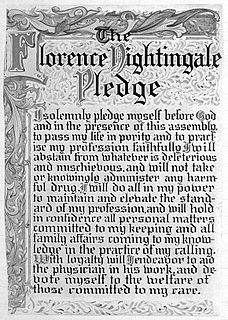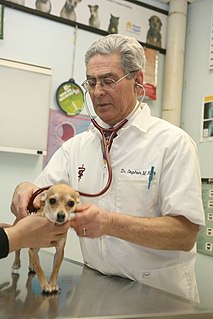Related Research Articles

An oath of office is an oath or affirmation a person takes before assuming the duties of an office, usually a position in government or within a religious body, although such oaths are sometimes required of officers of other organizations. Such oaths are often required by the laws of the state, religious body, or other organization before the person may actually exercise the powers of the office or organization. It may be administered at an inauguration, coronation, enthronement, or other ceremony connected with the taking up of office itself, or it may be administered privately. In some cases it may be administered privately and then repeated during a public ceremony.

The Hippocratic Oath is an oath of ethics historically taken by physicians. It is one of the most widely known of Greek medical texts. In its original form, it requires a new physician to swear, by a number of healing gods, to uphold specific ethical standards. The oath is the earliest expression of medical ethics in the Western world, establishing several principles of medical ethics which remain of paramount significance today. These include the principles of medical confidentiality and non-maleficence. As the seminal articulation of certain principles that continue to guide and inform medical practice, the ancient text is of more than historic and symbolic value. Swearing a modified form of the oath remains a rite of passage for medical graduates in many countries, and is a requirement enshrined in legal statutes of various jurisdictions, such that violations of the oath may carry criminal or other liability beyond the oath's symbolic nature.
The Declaration of Geneva was adopted by the General Assembly of the World Medical Association at Geneva in 1948, amended in 1968, 1983, 1994, editorially revised in 2005 and 2006 and amended in 2017.

A veterinarian (vet), also known as a veterinary surgeon or veterinary physician, is a medical professional who practices veterinary medicine. They manage a wide range of health conditions and injuries in non-human animals. Along with this, vets also play vital role in animal reproduction, animal health management, conservation, livestock care and breeding, and preventive medicine like animal nutrition, vaccination, and parasite control as well as bio security and zoonotic disease surveillance and prevention.

The American Veterinary Medical Association (AVMA), founded in 1863, is a not-for-profit association representing more than 99,500 veterinarians in the US.
A veterinary specialist is a veterinarian who specializes in a clinical field of veterinary medicine.

The Nightingale Pledge, named in honour of Florence Nightingale, is a modified version of the Hippocratic Oath. Lystra Gretter and a Committee for the Farrand Training School Grace for Nurses in Detroit, Michigan created the pledge in 1893. Gretter, inspired by the work of Nightingale, the founder of modern nursing, credited the pledge to the work of her committee, but was herself considered "the moving spirit behind the idea" for the pledge.

Veterinary education is the tertiary education of veterinarians. To become a veterinarian, one must first complete a veterinary degree in Doctor of Veterinary Medicine.
Engineering ethics is the field of system of moral principles that apply to the practice of engineering. The field examines and sets the obligations by engineers to society, to their clients, and to the profession. As a scholarly discipline, it is closely related to subjects such as the philosophy of science, the philosophy of engineering, and the ethics of technology.
The history of veterinary medicine in Pennsylvania officially began with the development of the profession in the early 1800s.
The Student American Veterinary Medical Association (SAVMA) is a national association of student chapters of the American Veterinary Medical Association (AVMA) at schools and colleges of veterinary medicine in the United States, Canada and the Caribbean. SAVMA acts as a single national voice for veterinary students in accordance with the policies and goals of the AVMA, coordinates AVMA student chapter activities, facilitates the exchange of information, and represents the interests of student veterinarians within AVMA, the veterinary profession and in the political and legislative arenas nationally.

The American Animal Hospital Association (AAHA) is a non-profit organization for companion animal veterinary hospitals. Established in 1933, the association is the only accrediting body for small animal hospitals in the U.S. and Canada. The association develops standards for veterinary business practices, publications, and educational programs. Any veterinary hospital can join AAHA as a member, but must then pass an evaluation in order to receive AAHA accreditation.
Veterinary ethics is a system of moral principles that apply values and judgements to the practice of veterinary medicine. As a scholarly discipline, veterinary ethics encompasses its practical application in clinical settings as well as work on its history, philosophy, theology, and sociology. Veterinary ethics combines veterinary professional ethics and the subject of animal ethics. The subject of veterinary ethics can be interpreted as an extension of critical thinking skills necessary to make the decisions in veterinary care in order to support the profession's responsibilities to animal kind and mankind.

Paraveterinary worker is the professional of veterinary science that performs procedures autonomously or semi autonomously, as part of a veterinary assistance system. The job role varies throughout the world, and common titles include veterinary nurse, veterinary technician and veterinary assistant, and variants with the prefix of 'animal health'.

The American College of Veterinary Surgeons (ACVS) is the specialty board that defines the standards of surgical excellence for the field of veterinary medicine, promotes advancements in veterinary surgery, and provides the latest in veterinary surgical educational programs. The ACVS is responsible for overseeing the training, examination, and certification of board-certified veterinary surgeons.

Veterinary medicine in the United States is the performance of veterinary medicine in the United States, normally performed by licensed professionals, and subject to provisions of statute law which vary by state. Veterinary medicine is normally led by veterinary physicians, termed veterinarians or vets.
The Federation of Veterinarians of Europe (FVE) is a non-profit umbrella organisation of veterinary organisations from 38 European countries. It was founded in 1975 and nowadays represents around 200,000 European veterinarians. The FVE strives to support veterinarians in delivering their professional responsibilities and representing the veterinary profession to the outside world. The FVE provides a platform for veterinarians across Europe to interact, to discuss and to develop position papers and professional guidelines. The current FVE motto is: "Veterinarians care for animals and people!" FVE publishes 4 times a year a newsletter which can be found on the FVE website.
The Canadian Veterinary Medical Association (CVMA), founded in 1876, provides leadership on national veterinary issues, advocates for animal welfare, and works to encourage life balance in veterinary professionals.
The Association of American Veterinary Medical Colleges (AAVMC) represents colleges and schools of veterinary medicine in the United States, Canada, and internationally. It advocates for issues related to veterinary medical education, oversees the accreditation process for veterinary medical schools and colleges along with the American Veterinary Medical Association, and manages the Veterinary Medical College Application Service.

Indian Veterinary Association - Kerala is the largest professional organization of veterinarians working or residing in the state of Kerala, India. It was founded in the year 1978, and has around 2200 member veterinarians at present with units in all the 14 districts of Kerala and the two veterinary colleges under Kerala Veterinary and Animal Sciences University.
References
- ↑ "Veterinarian's Oath". American Veterinary Medical Association. Retrieved 7 November 2015.
- ↑ "CVMA | Veterinarian Oath". www.canadianveterinarians.net. Retrieved 2015-11-07.